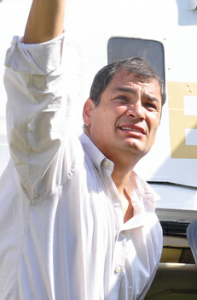Rafael Correa: The Minor-League Caudillo
 By Esther J. Cepeda, Voxxi
By Esther J. Cepeda, Voxxi
Before that, in January, there was the bizarre story of how an Internet campaign succeeded in shutting down hundreds of torture clinics where gay patients were starved and beaten in an effort to make them “straight.”
Ecuador always seems to be in the background. Lacking the glittering pomp of Brazil’s nouveau riche, the outsized violence of neighboring Colombia, or the clout of mass émigrés like Mexicans in the U.S. — there are only about 600,000 Ecuadoreans, or descendants living in this country, according to the Pew Hispanic Center – Ecuador is most often only an afterthought.
Then there’s Rafael Correa, the young, photogenic president, who has made his mark on a weary Ecuadorean populace by appealing to the indigenous population with his basic skills in their native language, Quechua, and with his programs to uplift the poor. He’s made an impression on everyone else by getting the country’s constitution amended so he could hold on to his presidency for as long as possible, by bullying the media with crackdowns and lawsuits, and, most recently, byboycotting the Summit of the Americas to protest Cuba’s continuing exclusion.
Now Rafael Correa, who earned his masters and Ph.D. in economics at the University of Illinois at Urbana-Champaign, may be trying to burnish his, and Ecuador’s, image on the international stage by considering harboring WikiLeaks founder Julian Assange.
The boyish, silver-haired whistle-blower caused an international incident last week by entering the Ecuadorean Embassy in London seeking protective asylum from the U.S. and Swedish governments. Both are after him over his publication of military and diplomatic secrets and allegations of rape and sexual abuse of two women dating back to 2010.
Apparently Assange got tight with the president after hosting Correa on his England-based talk show, which he broadcast while under house arrest last April. After 75 minutes of bantering with Correa about their mutual appreciation for each other and disdain for the U.S. — they commiserated about being “persecuted” and Assange bid Rafael Correa farewell by saying “don’t get assassinated” — they must have felt enough of a bond that Assange picked Ecuador over Cuba or Russia to evade the authorities.
Talk about a gold mine of an opportunity for Correa to step into the limelight. By publicly supporting Assange, he takes a step toward filling the shoes of Latin America’s current — and fading — political characters, the ailing Fidel Castro, whose constant death rumors have become old hat, and Venezuelan President Hugo Chavez, whose antics have taken a back seat to news of his battle with cancer.
It’s actually a depressing turn because outsized personalities are pretty much the only thing that keeps Latin America in the U.S. public eye. Now that migration from Mexico has slowed dramatically, Latin America is ignored even more. When President Obama goes south of the border, he seems to precede it by dropping some domestic bomb that keeps attention firmly on America’s political reactions to it. What did you hear more about, Obama’s trip to Mexico for the G-20 summit or his plan to waive deportations for hundreds of thousands of young illegal immigrants?
But is Correa cut out to become Latin America’s newest defiant provocateur? Forgive me for saying so, but he doesn’t have the chops. He may have the personality to play the role of strongman, but not the bombastic persona to ascend to chief anti-imperialist status.
As a relatively steady hand, Correa is well-regarded by the residents of a country that has always been skeptical of its revolving door of elected leaders — his approval ratings are at about 80 percent — but he’s not an icon by any stretch of the imagination. Even his Twitter feed is kind of a bore.
This article was first published in Voxxi.
Esther J. Cepeda writes a weekly column for the Chicago Sun-Times and three columns weekly for national newspaper syndication for the Washington Post Writers Group. She is an opinion journalist and expert on the issues of U.S. Hispanics/Latinos. She is a member of the National Association of Hispanic Journalists, The Chicago Headline Club, and The Society of Professional Journalist. You can learn more about her at www.estherjcepeda.com
[Photo by Gobierno Municipal de Piñas]
